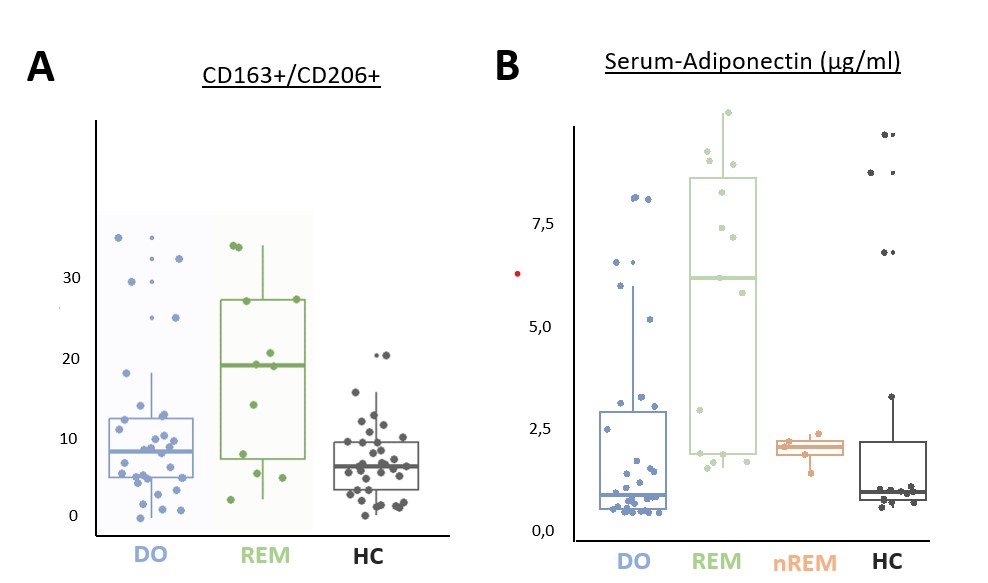Session Information
Date: Saturday, November 16, 2024
Title: Vasculitis – Non-ANCA-Associated & Related Disorders Poster I
Session Type: Poster Session A
Session Time: 10:30AM-12:30PM
Background/Purpose: The immunopathogenesis of giant cell arteritis (GCA) remains unclear. It is known that monocytes are recruited from peripheral blood, infiltrate the vessel wall, and differentiate into macrophages (1). These macrophages can exhibit either pro-inflammatory (CAM) or anti-inflammatory (AAM) properties (2). In preliminary work, we analyzed mRNA sequencing data from Estupiñán-Moreno et al., which showed that serum monocytes of patients with GCA in remission already expressed markers of AAM at mRNA level (3), which may be involved in the induction and maintenance of remission. The aim of our study was to determine whether human monocytes stimulated with serum from GCA patients, depending on the disease stage (initial diagnosis or remission) and treatment regimen, differentiate into different macrophage populations.
Methods: We isolated human monocytes from the venous blood of healthy controls and stimulated them with serum from patients with GCA at various disease stages (initial diagnosis and remission) and under different treatment regimens (n=30). The macrophages were characterized by flow cytometry based on the CD surface antigens CD14, CD16, CD80, CD86, CD163, and CD206. Subsequently, we analyzed the patient serum for factors influencing macrophage differentiation using a protein profiler (Protein Profiler™ Array, R&D, ARY022B) and ELISA.
Results: Monocytes stimulated with the serum of treatment-naïve patients at the initial diagnosis of GCA showed a significantly increased proportion of CAM (CD80+/CD86+), p< 0.05. In contrast, stimulation with the serum of patients in remission significantly increased the proportion of AAM (CD163+/206+), p< 0.01, Fig. 1A. No difference was found between patients in remission taking Tocilizumab or a glucocorticoid monotherapy. Using protein profiler and ELISA, we detected significantly elevated adiponectin levels in the serum of patients in remission, Fig. 1B. In patients who were not in remission despite therapy, adiponectin levels were not elevated (n=3). The addition of the adiponectin receptor antagonist MAPP inhibited the differentiation to AAM (n=3).
Conclusion: Adiponectin in the serum of GCA patients in remission induces the differentiation of monocytes into anti-inflammatory AAM and may thus play a role in controlling inflammation. Our findings could contribute to a better understanding of the disease, particularly the remission status, and to the development of new therapies for the treatment of GCA.
1. van Sleen Y et al. Involvement of Monocyte Subsets in the Immunopathology of Giant Cell Arteritis. Sci Rep. 2017;7:6553.
2. Jiemy WF et al. Distinct macrophage phenotypes skewed by local granulocyte macrophage colony‐stimulating factor (GM‐CSF) and macrophage colony‐stimulating factor (M‐CSF) are associated with tissue destruction and intimal hyperplasia in giant cell arteritis. Clin Transl Immunol. 2020;9:e1164
3. Estupiñán-Moreno E et al. Methylome and transcriptome profiling of giant cell arteritis monocytes reveals novel pathways involved in disease pathogenesis and molecular response to glucocorticoids. Ann Rheum Dis 2022 Jun 15. PMID: 35705375
To cite this abstract in AMA style:
Kernder A, Noack L, Morar A, Burg L, Lowin T, Bleck D, schneider m, Distler J, Pongratz G, Schäfer V. Regulation of Macrophage Differentiation by Serum Adiponectin: A Novel Mechanism to Increase Alternatively Activated Macrophages During the Remission Phase of Giant Cell Arteritis [abstract]. Arthritis Rheumatol. 2024; 76 (suppl 9). https://acrabstracts.org/abstract/regulation-of-macrophage-differentiation-by-serum-adiponectin-a-novel-mechanism-to-increase-alternatively-activated-macrophages-during-the-remission-phase-of-giant-cell-arteritis/. Accessed .« Back to ACR Convergence 2024
ACR Meeting Abstracts - https://acrabstracts.org/abstract/regulation-of-macrophage-differentiation-by-serum-adiponectin-a-novel-mechanism-to-increase-alternatively-activated-macrophages-during-the-remission-phase-of-giant-cell-arteritis/

